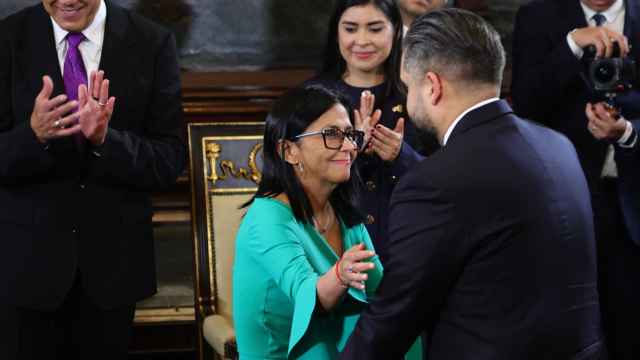The Caspian Pipeline Consortium agreed Wednesday on a $5.4 billion investment to double the pipeline's annual capacity to almost 70 million tons.
“The expansion is, in scale and scope, at least as big as the initial construction,” said Ian MacDonald, vice president of Chevron, which has a 15 percent stake in the venture.
The CPC's current Tengiz-Novorossiisk pipeline pumps crude oil 1,511 kilometers from the Tengiz oil field in Kazakhstan, around the northern shores of the Caspian and across Russian territory, to the Black Sea port of Novorossiisk.
In addition to Chevron, the consortium’s main shareholders are Russia’s Transneft and Kazakhstan’s KazMunaiGaz. There are eight other international participants.
The finalized project cost is more than double the $2 billion estimate made by the consortium in 2005.
Russian Energy Minister Sergei Shmatko said at the signing ceremony in Moscow that the negotiations had been “complicated” but the final agreement demonstrated “the close work of governments and companies” and a “high level of cooperation with Kazakhstan.”
Expected annual revenues after completion in 2014 are $2.3 billion. These are guaranteed by “pump or pay” agreements — in which members of the consortium must pay compensation if they fail to supply contracted volumes. A temporarily increased pipeline tariff of $38 per ton was also made permanent on Wednesday.
Lukarco, owned by LUKoil, has agreed to supply another 6 million tons of oil on top of the 4 million tons already guaranteed, fulfilling its quota of 10 million tons, Osman Sapayev, Lukarco's head, told journalists.
Finance for the project will come from the revenue it generates. Additional funds will come from a freeze on debt repayment to shareholders. The director of CPC, Nikolai Platonov, said CPC had a total debt of $5 billion, Interfax reported.
If these funds are not sufficient, foreign loans will be sought. CPC enjoys a high credit rating, MacDonald said, and it might seek up to $1.2 billion next year for the expansion project.
Half of Kazakhstan's Tengiz oil field's output is currently exported by the CPC. Once the pipeline expansion has been completed, the field's entire output could be channeled this way, MacDonald said, “de-bottlenecking Kazakhstan's export capabilities.”
This will free up infrastructure in the area for the development of other oil fields, he said.
The president of Kazakhstan's state-run KazMunaiGaz company, Kairgeldy Kabyldin, said oil production in Kazakhstan, now 80 million tons a year, is set to rise to 120 million tons by 2015.
Construction is due to begin in spring 2011 and proceed in three stages, with output reaching 67 million tons after the work is finished in by 2014.
The three largest shareholders will project manage the expansion. Construction contracts will be awarded in the first quarter of 2011, Chevron said in a statement on its web site.
CPC's pipeline opened in 2001 and discussions turned almost immediately to expansion, but negotiations dragged on until this year. Citing unidentified shareholders, Vedomosti reported Tuesday that there are serious concerns about a possible lack of demand, jeopardizing the economic viability of the expansion.
A Message from The Moscow Times:
Dear readers,
We are facing unprecedented challenges. Russia's Prosecutor General's Office has designated The Moscow Times as an "undesirable" organization, criminalizing our work and putting our staff at risk of prosecution. This follows our earlier unjust labeling as a "foreign agent."
These actions are direct attempts to silence independent journalism in Russia. The authorities claim our work "discredits the decisions of the Russian leadership." We see things differently: we strive to provide accurate, unbiased reporting on Russia.
We, the journalists of The Moscow Times, refuse to be silenced. But to continue our work, we need your help.
Your support, no matter how small, makes a world of difference. If you can, please support us monthly starting from just $2. It's quick to set up, and every contribution makes a significant impact.
By supporting The Moscow Times, you're defending open, independent journalism in the face of repression. Thank you for standing with us.
Remind me later.






